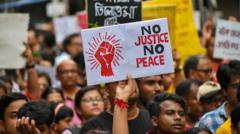A court in Kolkata has sentenced Sanjoy Roy to life imprisonment following his conviction for the brutal rape and murder of a junior doctor, a case that has dominated headlines and sparked massive protests throughout India. Although the prosecution sought the death penalty, the judge ultimately chose life in prison, citing legal guidelines. The defendant, a hospital volunteer, continues to assert his innocence and plans to appeal the ruling.
Life Sentence for Indian Man Convicted of Rape and Murder of Doctor Sparks Nationwide Protests

Life Sentence for Indian Man Convicted of Rape and Murder of Doctor Sparks Nationwide Protests
A court in India issues a life sentence for a man found guilty of the rape and murder of a junior doctor, igniting renewed calls for justice from the public and the victim's family.
The incident occurred last August at the state-run RG Kar Medical College and Hospital. The 31-year-old victim was discovered half-naked and severely injured by a colleague in a seminar hall after a night shift. Autopsy results revealed that she had been strangled, and her body bore signs of having fought off her attacker. The public outcry was swift, with doctors holding strikes demanding justice and highlighting safety concerns for healthcare workers, particularly women in the country.
The victim's family expressed outrage at the sentence, stating that they had hoped for capital punishment as restitution for their loss. "We will continue our fight, and won't let investigations stop... Come what may, we will fight for justice," her father declared to the AFP news agency. Indian law prohibits the identification of victims of sexual violence, further complicating the emotional landscape surrounding the case.
The Central Bureau of Investigation’s chargesheet noted that Roy was intoxicated at the time of the crime and gained access to the hospital to confront the doctor. Roy’s conviction highlights ongoing issues related to sexual violence and poses challenging questions about the broader societal mechanisms at play in India. As the case unfolds, it remains a poignant reminder of the pressing need for systemic reforms to enhance the protection of vulnerable individuals in healthcare settings.
The victim's family expressed outrage at the sentence, stating that they had hoped for capital punishment as restitution for their loss. "We will continue our fight, and won't let investigations stop... Come what may, we will fight for justice," her father declared to the AFP news agency. Indian law prohibits the identification of victims of sexual violence, further complicating the emotional landscape surrounding the case.
The Central Bureau of Investigation’s chargesheet noted that Roy was intoxicated at the time of the crime and gained access to the hospital to confront the doctor. Roy’s conviction highlights ongoing issues related to sexual violence and poses challenging questions about the broader societal mechanisms at play in India. As the case unfolds, it remains a poignant reminder of the pressing need for systemic reforms to enhance the protection of vulnerable individuals in healthcare settings.






















